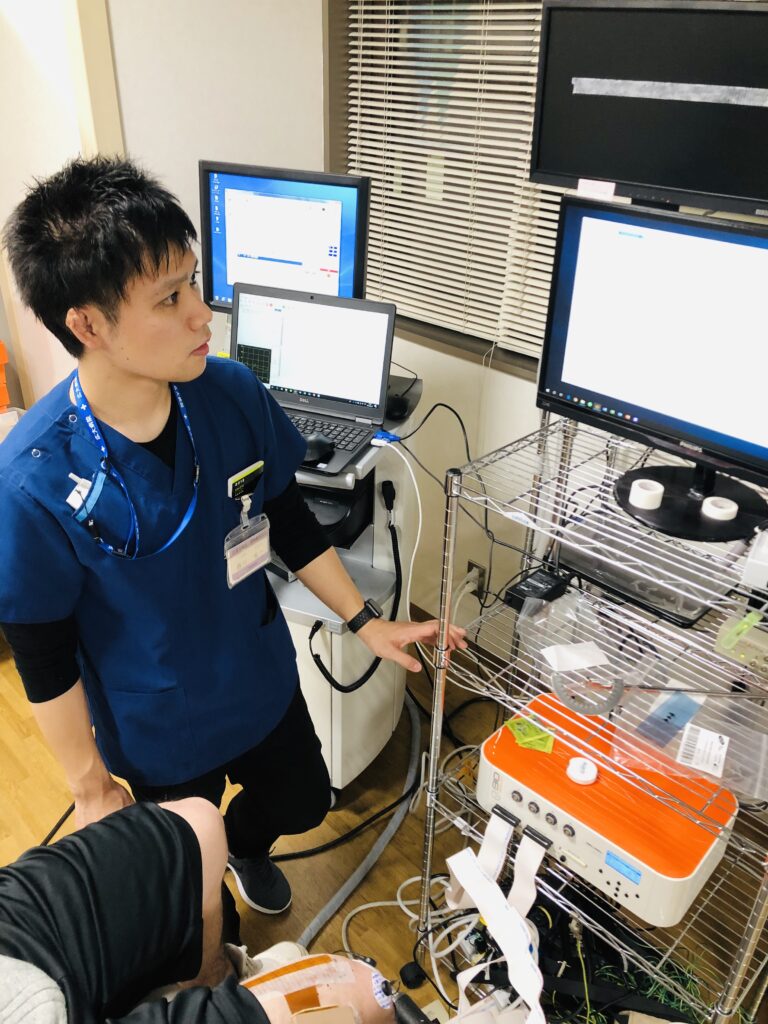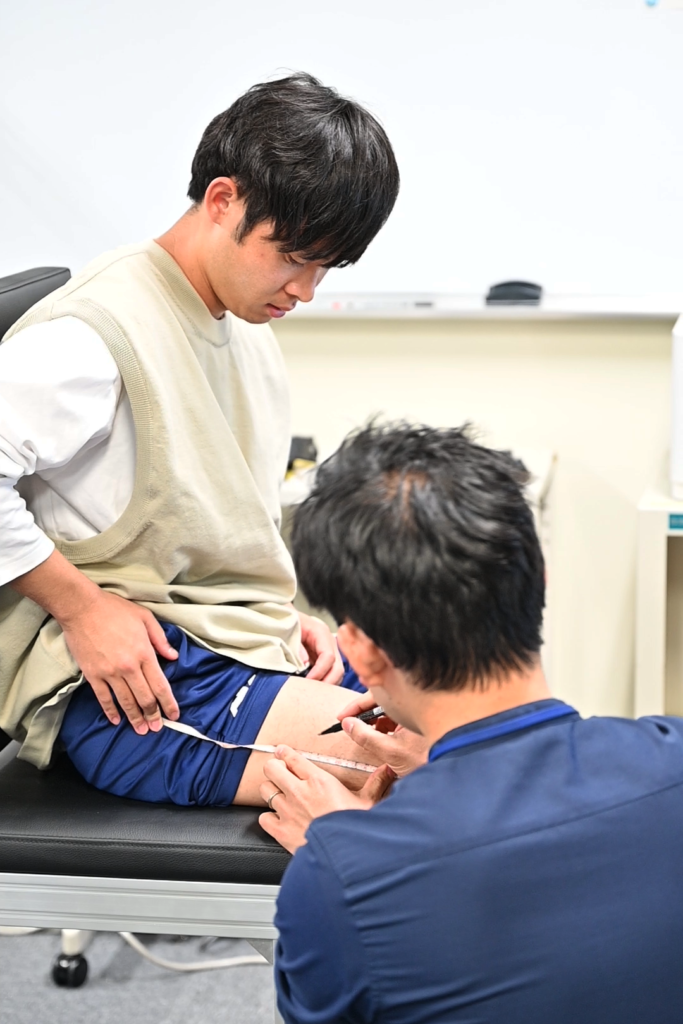From Clinical Practice to Research

Before embarking on his research career, Assosicate Proffesor Nishikawa spent ten years working as a physical therapist at a university hospital outside Ishikawa Prefecture. A Physical therapists specialize in rehabilitation, helping patients recover from physical impairments caused by injury or illness through exercise and therapeutic techniques. During his time in clinical practice, Assoc. Prof. Nishikawa became acutely aware of the limited availability of medical equipment tailored to individual patient needs. This realization sparked his interest in developing and refining sensors capable of accurately measuring biometric data, as well as rehabilitation devices. Above all, it deepened his appreciation for the role of engineering in healthcare. Driven by a desire to “help more patients” and “shed light on the unknown,” he made the bold decision to enter the field of bioengineering—an area outside his original expertise. As he progressed through his master’s and doctoral studies, he found it intellectually rewarding to connect the questions he had encountered in clinical settings with new insights gained through experimentation and analysis. Gradually, he became deeply immersed in research.
Engineering Early Detection: A Painless Approach to ALS Diagnosis
 Assoc. Prof. Nishikawa currently specializes in rehabilitation engineering and medical bioengineering, both interdisciplinary fields that integrate engineering and medicine. His research aims to incorporate emerging technologies into rehabilitation and clinical care to better understand life and biological phenomena—and ultimately to enable earlier diagnosis and treatment.
One of his most notable innovations is a needle-free, painless biosensor. By detecting subtle electrical signals on the skin’s surface, the device can measure motor nerve activity with exceptional sensitivity. According to Assoc. Prof. Nishikawa, this technology has the potential to identify early signs of amyotrophic lateral sclerosis (ALS)—a progressive neurodegenerative disease that causes muscle wasting due to nerve damage. Conventional diagnostic methods rely on needle-based testing, which often fails to detect ALS in its early stages. Since ALS currently has no curative treatment and relies on symptom management, this sensor could become a valuable tool for early detection and intervention.
? ?
Assoc. Prof. Nishikawa currently specializes in rehabilitation engineering and medical bioengineering, both interdisciplinary fields that integrate engineering and medicine. His research aims to incorporate emerging technologies into rehabilitation and clinical care to better understand life and biological phenomena—and ultimately to enable earlier diagnosis and treatment.
One of his most notable innovations is a needle-free, painless biosensor. By detecting subtle electrical signals on the skin’s surface, the device can measure motor nerve activity with exceptional sensitivity. According to Assoc. Prof. Nishikawa, this technology has the potential to identify early signs of amyotrophic lateral sclerosis (ALS)—a progressive neurodegenerative disease that causes muscle wasting due to nerve damage. Conventional diagnostic methods rely on needle-based testing, which often fails to detect ALS in its early stages. Since ALS currently has no curative treatment and relies on symptom management, this sensor could become a valuable tool for early detection and intervention.
? ?
Contributing to Society Through the Power of Bioengineering
 In addition to pursuing answers to unresolved questions, Assoc. Prof. Nishikawa is deeply committed to publishing his research findings as quickly as possible. He believes that the true value of bioengineering lies in its ability to share new insights with the medical community through academic publications—and to translate those findings into real-world rehabilitation and clinical applications without delay.
Unlike the development of new pharmaceuticals, which typically requires lengthy approval processes before practical use, bioengineering allows for more immediate implementation. Technologies for rehabilitation and biometric measurement can be introduced in collaboration with clinical settings, enabling faster impact.
With a spark in his eyes, Assoc. prof. Nishikawa shares, “The fact that our research can be directly applied to society is what motivates me to keep going.”
In addition to pursuing answers to unresolved questions, Assoc. Prof. Nishikawa is deeply committed to publishing his research findings as quickly as possible. He believes that the true value of bioengineering lies in its ability to share new insights with the medical community through academic publications—and to translate those findings into real-world rehabilitation and clinical applications without delay.
Unlike the development of new pharmaceuticals, which typically requires lengthy approval processes before practical use, bioengineering allows for more immediate implementation. Technologies for rehabilitation and biometric measurement can be introduced in collaboration with clinical settings, enabling faster impact.
With a spark in his eyes, Assoc. prof. Nishikawa shares, “The fact that our research can be directly applied to society is what motivates me to keep going.”
Today, Japan stands on the brink of becoming a super-aged society—unparalleled anywhere in the world. In this era of preventive medicine, where the concept of “pre-symptomatic” conditions (states in which individuals are not yet ill but are not fully healthy) is gaining attention, the biomedical measurement technologies and medical devices developed by Dr. Nishikawa are poised to play an increasingly vital role. “I want to be more actively involved in developing technologies that can detect and diagnose physical abnormalities before symptoms appear,” he says. “Rather than waiting for symptoms to emerge and then taking action, I aim to prevent even the earliest signs of unwellness.”
(Yuko Mitera, Science Writer)







 PAGE TOP
PAGE TOP